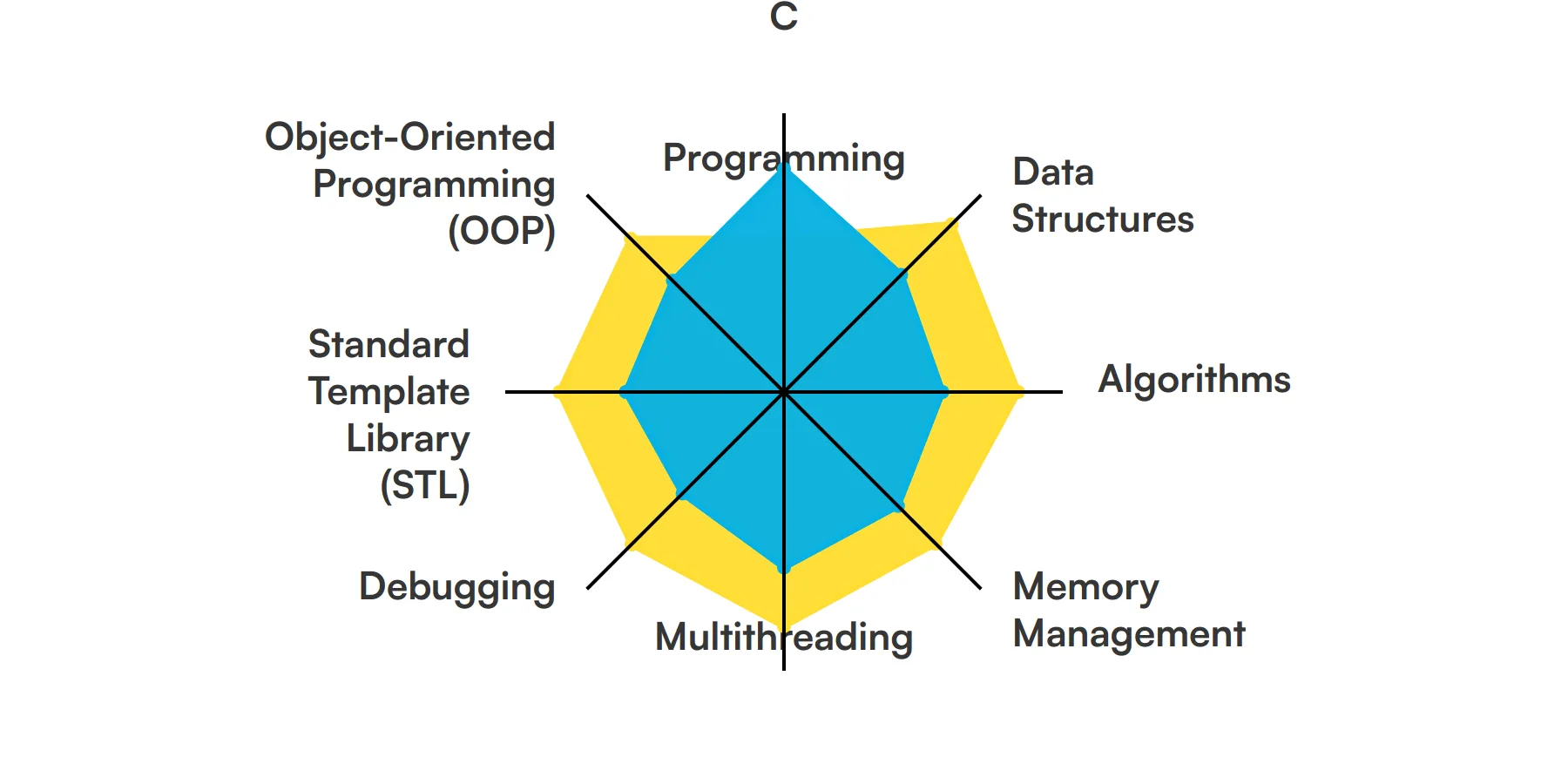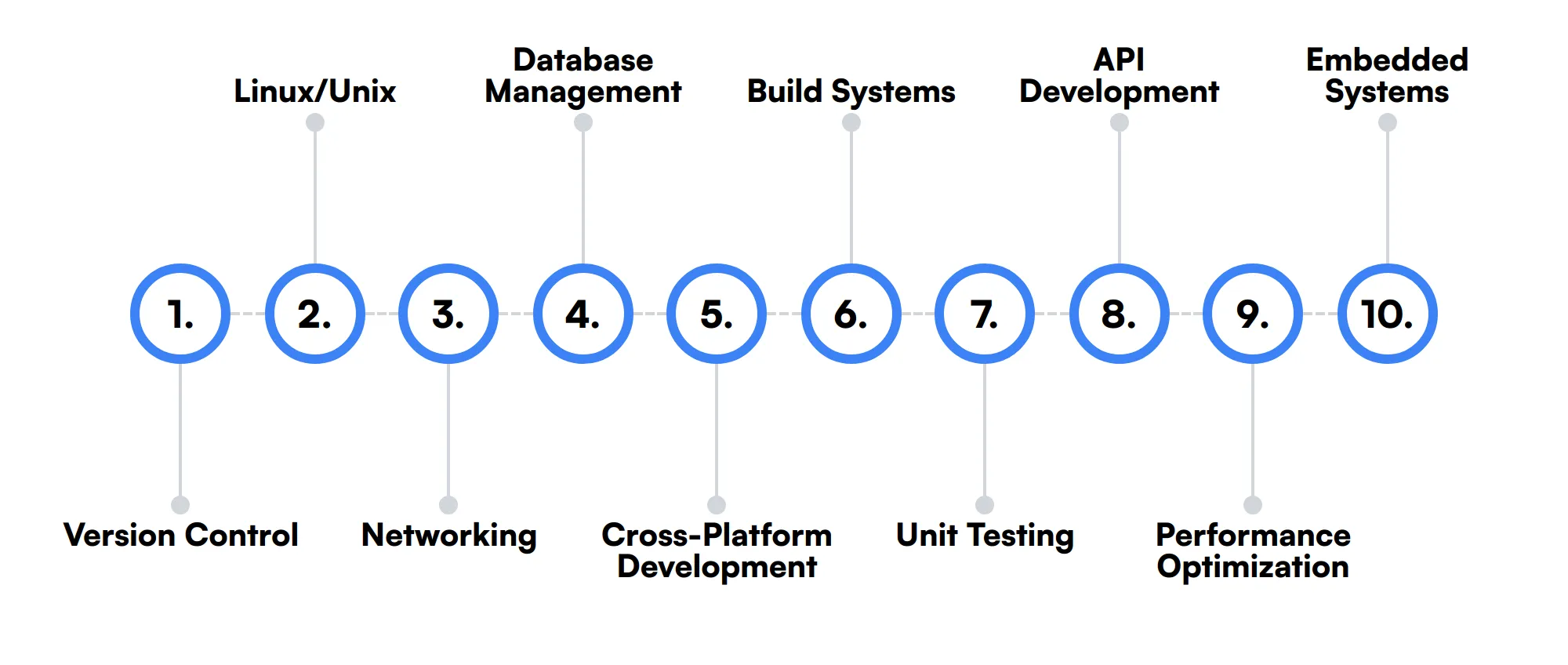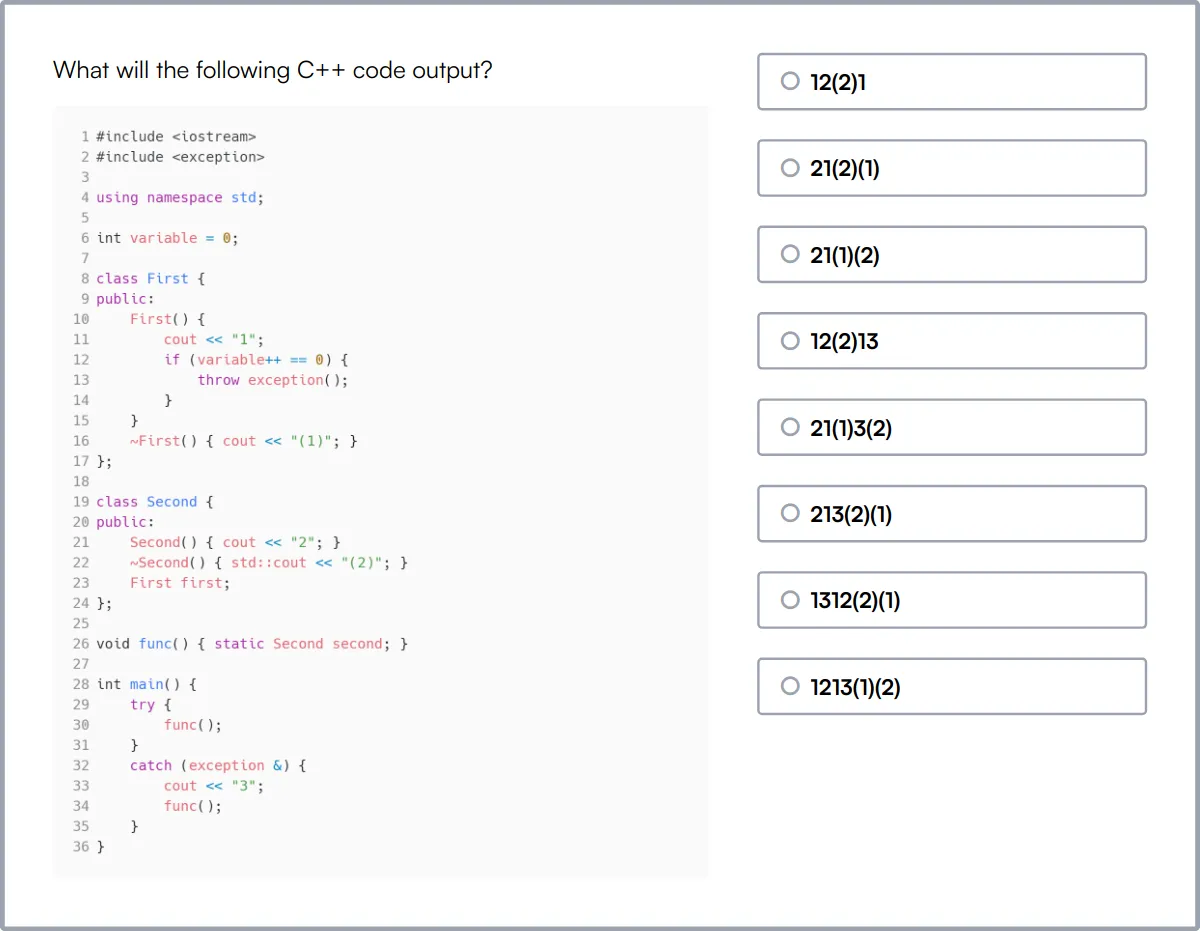C++ developers are the backbone of many software applications, from operating systems to game engines. They work on performance-critical applications, ensuring that the software runs efficiently and reliably.
C++ development skills include a strong understanding of object-oriented programming, proficiency in the C++ language, and familiarity with standard libraries and frameworks. Additionally, skills like debugging, problem-solving, and attention to detail are crucial for success in this role.
Candidates can write these abilities in their resumes, but you can’t verify them without on-the-job C++ Developer skill tests.
In this post, we will explore 8 essential C++ Developer skills, 10 secondary skills and how to assess them so you can make informed hiring decisions.
Table of contents
8 fundamental C++ Developer skills and traits
The best skills for C++ Developers include C++ Programming, Data Structures, Algorithms, Memory Management, Multithreading, Debugging, Standard Template Library (STL) and Object-Oriented Programming (OOP).
Let’s dive into the details by examining the 8 essential skills of a C++ Developer.

C++ Programming
A C++ developer must have a deep understanding of C++ syntax and semantics. This includes knowledge of object-oriented programming, templates, and the Standard Template Library (STL). Mastery of these elements allows the developer to write efficient and maintainable code.
For more insights, check out our guide to writing a C++ Developer Job Description.
Data Structures
Understanding data structures like arrays, linked lists, stacks, queues, trees, and graphs is crucial. A C++ developer uses these structures to organize and store data efficiently, which is fundamental for solving complex problems and optimizing performance.
Algorithms
Knowledge of algorithms is essential for a C++ developer to solve problems effectively. This includes sorting, searching, and graph algorithms. Implementing these algorithms efficiently can significantly improve the performance of applications.
Check out our guide for a comprehensive list of interview questions.
Memory Management
C++ developers need to manage memory manually, which involves allocating and deallocating memory using pointers. Proper memory management is critical to avoid leaks and ensure the application runs smoothly.
Multithreading
Understanding multithreading and concurrency is important for developing applications that perform multiple tasks simultaneously. A C++ developer uses these concepts to improve the performance and responsiveness of applications.
Debugging
Proficiency in debugging is necessary to identify and fix issues in the code. A C++ developer uses debugging tools and techniques to trace errors, understand their causes, and resolve them efficiently.
Standard Template Library (STL)
The STL provides a collection of pre-built classes and functions for common data structures and algorithms. A C++ developer leverages the STL to write more concise and efficient code, reducing development time.
Object-Oriented Programming (OOP)
OOP principles like inheritance, polymorphism, and encapsulation are fundamental in C++. A C++ developer uses these principles to create modular and reusable code, making the software easier to maintain and extend.
10 secondary C++ Developer skills and traits
The best skills for C++ Developers include Version Control, Linux/Unix, Networking, Database Management, Cross-Platform Development, Build Systems, Unit Testing, API Development, Performance Optimization and Embedded Systems.
Let’s dive into the details by examining the 10 secondary skills of a C++ Developer.

Version Control
Familiarity with version control systems like Git is important for managing code changes and collaborating with other developers. It helps in tracking revisions and maintaining a history of the codebase.
Linux/Unix
Many C++ applications are developed and deployed on Linux/Unix systems. Understanding these operating systems, including command-line tools and shell scripting, is beneficial for a C++ developer.
Networking
Knowledge of networking concepts and protocols can be useful, especially for developers working on applications that require network communication. This includes understanding sockets, TCP/IP, and HTTP.
Database Management
Understanding database management systems (DBMS) and SQL is useful for developers who need to interact with databases. This skill helps in designing, querying, and managing databases effectively.
Cross-Platform Development
Experience with cross-platform development tools and libraries allows a C++ developer to create applications that run on multiple operating systems. This is particularly useful for developing software that needs to be widely accessible.
Build Systems
Knowledge of build systems like CMake or Make is important for automating the compilation and linking process. This helps in managing complex projects and ensuring consistent builds.
Unit Testing
Writing and running unit tests is crucial for ensuring code quality and reliability. A C++ developer uses testing frameworks to create tests that verify the functionality of individual components.
API Development
Experience in developing and consuming APIs is beneficial for creating modular and scalable applications. This includes understanding RESTful services and integrating third-party APIs.
Performance Optimization
Optimizing code for performance is a valuable skill. A C++ developer analyzes and refines code to improve execution speed and reduce resource consumption, ensuring the application runs efficiently.
Embedded Systems
For developers working in embedded systems, knowledge of hardware and low-level programming is important. This includes understanding microcontrollers, real-time operating systems (RTOS), and interfacing with hardware components.
How to assess C++ Developer skills and traits
Assessing the skills and traits of a C++ developer involves more than just glancing at their resume. It requires a deep dive into their technical prowess and problem-solving capabilities. Understanding their proficiency in key areas such as C++ programming, data structures, and algorithms is fundamental.
Traditional methods like interviews and resume reviews can provide some insights, but they often fall short in revealing the true depth of a candidate's skills. This is where practical assessments come into play. By employing tests that measure abilities in memory management, multithreading, and debugging, employers can get a clearer picture of a candidate's potential.
For a streamlined and effective assessment process, consider using Adaface assessments, which are designed to evaluate the core competencies of C++ developers. These tests cover a range of topics from the Standard Template Library (STL) to Object-Oriented Programming (OOP), ensuring a comprehensive evaluation. With Adaface, companies have seen a 2x improvement in the quality of hires and an 85% reduction in screening time.
Let’s look at how to assess C++ Developer skills with these 3 talent assessments.
C++ Online Test
Our C++ Online Test evaluates a candidate's ability to write C++ programs, structure code using Object-oriented programming principles, handle exceptions, and manage memory.
The test assesses their understanding of C++ basics, functions, data structures, STL, OOPS concepts, memory management, and concurrency features. It includes scenario-based and code tracing MCQs, as well as a coding question to evaluate hands-on C++ coding skills.
Successful candidates demonstrate proficiency in using existing classes and creating new ones, handling exceptions, and managing memory effectively. They also show a strong grasp of the Standard Template Library (STL) and concurrency features.

Software Engineering Online Test
Our Software Engineering Online Test evaluates candidates on their understanding of core computer science concepts such as data structures, algorithms, databases, programming paradigms, and design patterns.
The test covers Object-Oriented Programming, database design, algorithms and data structures, testing and quality assurance, web development, software security, and code optimization. It includes scenario-based MCQs and a coding question to assess problem-solving and hands-on programming ability.
High-scoring candidates show a deep understanding of software engineering principles and demonstrate their ability to optimize code, design efficient algorithms, and ensure software security.
Loadrunner Online Test
Our Loadrunner Online Test evaluates a candidate's knowledge and skills in using Loadrunner, a performance testing tool used to test the performance and scalability of web applications.
The test assesses their understanding of Loadrunner basics, scripting and scenarios, load testing concepts, performance monitoring and analysis, script enhancement and customization, parameterization and correlation, think time and pacing, response time and throughput, error handling and debugging, and test execution and result analysis.
Candidates who perform well demonstrate a strong grasp of performance testing concepts and the ability to effectively use Loadrunner for performance monitoring, script enhancement, and result analysis.
Summary: The 8 key C++ Developer skills and how to test for them
| C++ Developer skill | How to assess them |
|---|---|
| 1. C++ Programming | Evaluate a developer's proficiency in writing and understanding C++ code. |
| 2. Data Structures | Assess understanding and application of various data structures in solutions. |
| 3. Algorithms | Check ability to design, implement, and optimize algorithms. |
| 4. Memory Management | Review knowledge and application of dynamic memory handling. |
| 5. Multithreading | Test skills in writing concurrent and parallel code. |
| 6. Debugging | Determine capability to identify and fix software bugs. |
| 7. Standard Template Library (STL) | Gauge familiarity with STL containers, algorithms, and functions. |
| 8. Object-Oriented Programming (OOP) | Examine expertise in using classes, inheritance, and polymorphism. |
C Online Test
C++ Developer skills FAQs
What are the key skills to look for in a C++ developer?
Key skills include C++ programming, data structures, algorithms, memory management, multithreading, debugging, and familiarity with the Standard Template Library (STL).
How can I assess a candidate's proficiency in C++ programming?
You can assess proficiency through coding tests, technical interviews, and reviewing past projects or contributions to open-source C++ projects.
Why is knowledge of data structures and algorithms important for a C++ developer?
Data structures and algorithms are fundamental for writing efficient code and solving complex problems, which are common tasks in C++ development.
What methods can be used to evaluate a candidate's debugging skills?
Evaluate debugging skills by presenting coding challenges with bugs and asking candidates to identify and fix them, or by discussing their past experiences with debugging.
How important is memory management in C++ development?
Memory management is critical in C++ due to manual memory allocation and deallocation, which can lead to issues like memory leaks if not handled properly.
What role does multithreading play in C++ development?
Multithreading allows C++ programs to perform multiple tasks simultaneously, improving performance and responsiveness, especially in high-performance applications.
How can I test a candidate's knowledge of the Standard Template Library (STL)?
You can test STL knowledge by asking candidates to solve problems using STL containers and algorithms, or by discussing how they have used STL in past projects.
Why is experience with version control systems important for C++ developers?
Version control systems like Git are essential for collaboration, tracking changes, and managing codebases in software development projects.
Assess and hire the best C++ Developers with Adaface
Assessing and finding the best C++ Developer is quick and easy when you use talent assessments. You can check out our product tour, sign up for our free plan to see talent assessments in action or view the demo here:

40 min skill tests.
No trick questions.
Accurate shortlisting.
We make it easy for you to find the best candidates in your pipeline with a 40 min skills test.
Try for freeRelated posts
Free resources



